Imagine launching a new product feature after weeks of internal debate—only to find that customers didn’t want it, didn’t understand it, or worse, didn’t notice it. You sent out a survey. A few clicks, a few ratings. Nothing actionable. Nothing urgent. Just... noise.
You’re not alone.
Traditional surveys often fail not because people don’t care, but because the questions aren’t right, the timing is off, or the insights come too late to make a difference.
Now, picture a smarter feedback loop. One where questions adapt to context, sentiment is analyzed in real-time, and action-worthy insights land in your inbox before the issue spirals. A customer leaves a comment like, "The experience felt clunky." AI flags the emotion behind it, links it to a specific UI step, and suggests improvements—automatically.
That’s the promise of AI surveys.
In this article, we’ll explore how AI surveys are redefining how teams collect, interpret, and act on feedback—with use cases, real-world examples, best practices, and ready-to-use AI-generated questions. Whether you’re scaling CX programs, refining products, or running market research—this is where better questions lead to smarter decisions.
TL;DR
- AI Surveys are revolutionizing traditional survey methods, offering advanced features like real-time feedback, bias detection, and personalized experiences.
- They automate tasks, enable quicker question generation, and provide predictive modeling, enhancing efficiency and accuracy.
- Businesses can monitor onboarding experience, drive product innovation, optimize marketing campaigns, streamline market research, and do more using AI-powered surveys.
- To leverage AI surveys, you should define clear objectives, keep surveys clear and concise, use diverse question types, personalize experiences, and use automation.
- Further, we've also covered the top tips for creating effective AI surveys, emphasizing sentiment analysis, automated triggers, and real-time response monitoring.
- Zonka Feedback offers a complete suite of features when it comes to using artificial intelligence in surveys. It is powered with AI for sentiment and text analysis to help you collect and analyze feedback faster. You can schedule a demo to explore the product.
Collect & Measure Customer Feedback
With AI Surveys, quickly create survey questions to understand what customers need and learn ways to delight them.

What are AI Surveys?
AI surveys are the next evolution in feedback collection—intelligent forms that don't just gather data, but understand it. They use of advanced technology and algorithms to automate various aspects of the survey process.
Unlike traditional surveys, which rely on static question sets and manual data analysis, AI surveys adapt in real time, personalize the respondent journey, and analyze responses with contextual awareness. They use artificial intelligence to not only generate relevant questions but also interpret meaning, detect sentiment, and surface insights automatically.
With AI surveys, you can eliminate the need for human intervention in tasks such as data entry and survey report analysis. The technology can automatically collect responses from various survey collection channels like online forms or chatbots, categorize them based on predefined criteria, identify patterns and trends within the data, and generate comprehensive reports in real time.
Evolution from Traditional to AI-Powered Surveys
For decades, surveys have been a blunt instrument: send, wait, analyze (eventually), and hope something useful shows up.
But the feedback world has changed. Customers and employees expect seamless experiences—and instant responses. Traditional survey methods often create delays, generic insights, and missed opportunities. According to a report, 62% of organizations say their current feedback systems lack real-time responsiveness—a gap that AI can fill with ease.
AI surveys were built to solve that. They introduce automation at every layer: generating the right questions, adjusting based on previous answers, translating languages instantly, and flagging emotional cues before a human ever steps in.
Key Components of an AI Survey System
Let us look at some of the key components of an AI survey system.
- Natural Language Processing (NLP): NLP allows surveys to move beyond yes/no and multiple-choice answers. It reads open-text responses the way a human would—understanding nuance, intent, and emotion. This makes feedback more conversational and less robotic, capturing what respondents mean, not just what they click.
- Sentiment Analysis: AI doesn’t just record feedback—it feels it. Sentiment analysis automatically classifies responses as positive, negative, or neutral, and often digs deeper into underlying emotion. For instance, if a customer says, “Your app’s new layout is confusing and slow,” AI flags it as a negative sentiment and associates it with usability pain points.
- Predictive Analytics: The real magic? AI doesn’t just tell you what happened—it hints at what’s coming. By analyzing historical trends, behavioral patterns, and survey response data, AI can forecast likely outcomes—such as churn risk, declining satisfaction, or unmet feature expectations—before they fully unfold.
- Dynamic Question Generation: AI-generated questions are not just faster—they're smarter. Instead of manually crafting every question, teams can now prompt an AI to generate relevant survey questions based on themes, goals, or response history. These questions adapt mid-survey using logic and context, creating personalized journeys that boost completion rates and data quality.
- Contextual Smart Probing: One of the most transformative AI survey capabilities is its ability to respond like a human conversation—digging deeper when needed. If a customer says, “The shoe size wasn’t available,” the AI instantly asks, “Which size?” or “Was this online or in-store?” These smart, contextual prompts turn open-ended responses into clear, actionable insights—helping CX teams resolve issues faster, personalize support, and trigger the right workflows.
Leveraging the Power of AI Surveys: Advantages & Benefits
AI surveys offer numerous advantages for businesses. They enhance efficiency by automating repetitive tasks, improve accuracy by minimizing human error, provide real-time insights, and increase the reach of surveys. By leveraging AI technology, you can optimize their survey processes and obtain valuable insights that can drive informed decision-making.
1. Faster Feedback Collection and Analysis
Speed isn’t a luxury anymore—it’s a necessity. In traditional feedback cycles, valuable insights often arrive after the window for action has already closed. AI surveys compress that timeline. Responses are analyzed as they come in, with sentiment, themes, and urgency tagged automatically. Teams no longer need to wait for the quarterly report—they get real-time visibility into what's happening right now.
The payoff? Early intervention, faster resolution, and decisions made while the moment still matters. AI-driven customer feedback tools allow this level of responsiveness without overburdening teams, helping you act while feedback is still fresh.
2. Enhanced Survey Personalization at Scale
A generic survey is easy to ignore. A relevant one gets answered. AI surveys personalize the experience based on each respondent’s behavior, previous interactions, or known preferences—without requiring manual segmentation. The flow of questions adapts in real-time, skipping irrelevant paths and honing in on what matters to each user.
This isn't personalization for the sake of engagement. It’s personalization for better data integrity. You get responses that are more accurate, more complete, and more emotionally honest.
3. Real-Time Response Monitoring and Alerts
When something breaks in the experience, waiting hours—or days—to know about it is unacceptable.
AI-powered response monitoring flags anomalies as they happen. Sudden spikes in negative sentiment, recurring friction points, or even language shifts in open-text feedback are surfaced through intelligent alerts.
Zonka Feedback’s AI Feedback Intelligence, for instance, allows teams to set up smart thresholds—so if a frontline issue repeats across regions or channels, you’re notified instantly. Action isn’t just faster—it’s focused. This level of automation is particularly valuable in conducting NPS surveys, where immediate action on detractor feedback can make the difference between churn and recovery.
4. Multilingual Capabilities and Translation
If your feedback system only works in English, it’s leaving insights on the table.
AI surveys automatically translate questions and responses across languages while maintaining semantic integrity. But it goes further—tone, slang, and emotional nuance are preserved, allowing for accurate analysis of global audiences.
This is especially valuable for distributed operations where insights must be aggregated across cultures without sacrificing clarity.
5. Predictive Insights to Preempt Churn or Dissatisfaction
AI survey generator doesn’t just explain what happened—it predicts what’s coming. Using patterns in historical survey data, behavioral triggers, and even text sentiment, AI surveys can identify early signs of disengagement, dissatisfaction, or churn. This means you can act before a silent detractor leaves—or before a service issue escalates to a social media crisis.
The value here is strategic: insight becomes foresight. You move from reactive CX to proactive retention.
6. Bias Detection and Clean Data Handling
Even the most well-intentioned surveys can carry hidden bias—in how questions are phrased, how responses are interpreted, or who gets surveyed.
AI algorithms can scan for skewed language, leading questions, or demographic imbalances, alerting you before the data is compromised. This isn’t just about fairness—it’s about accuracy.
With cleaner data and more inclusive feedback, decisions based on survey results become more defensible and representative of your full customer or employee base.
AI Survey Use Cases & Examples
There are numerous examples of how surveys powered by artificial intelligence and AI-generated questions have proven to be invaluable tools for businesses seeking to maximize the value of their customer feedback. These AI-powered surveys have revolutionized the way businesses collect and analyze customer insights, allowing them to make data-driven decisions and drive meaningful improvement.
Here are some of the top use cases and examples:
1. Onboarding Feedback & Early Experience Monitoring
First impressions in digital experiences are like handshakes—you only get one.
That’s why AI surveys are so effective during onboarding. Instead of sending the same welcome survey to everyone, AI-generated survey questions can adapt based on what each user did—or didn’t—engage with. If someone skipped the tutorial, the AI might ask why. If another breezed through setup, it might ask what worked well.
For instance, a SaaS company rolled out onboarding surveys triggered after users completed their first task. Based on AI sentiment analysis, they discovered that while the UX felt “clean,” users were often “unsure” about next steps. This insight led to a simple change: adding progress indicators and contextual tooltips—reducing onboarding drop-off by 19%.
2. CSAT, CES & NPS Programs – At Scale
Running CSAT or NPS programs across products, teams, or geographies often leads to a backlog of raw scores and open-ended text. But what if your system could read those responses, categorize them, and tell you what to do next?
That’s exactly what AI-powered NPS software does.
Take, for example, a financial services brand using AI to manage post-interaction CSAT and NPS surveys across five regions. Instead of manually reviewing feedback, their customer feedback tool tagged complaints about long hold times and flagged a tone of rising frustration. The alerts helped call center leads adjust staffing within a week—raising CSAT scores by 12% that quarter.
It’s not about the score anymore—it’s about what you can do with it, instantly.
3. Feature Adoption & Product Usability Insights
You launched a new feature. The usage numbers are low. The team’s stuck wondering—is it visibility, complexity, or just lack of interest? AI surveys cut through that fog.
Instead of waiting for support tickets or anecdotal feedback, you can deploy short, in-app AI surveys triggered by user behavior—like ignoring a feature or abandoning mid-flow. The responses, analyzed in real time, reveal friction points that usage metrics can’t.
A mobile productivity app used this to great effect. When users ignored a new calendar sync feature, AI survey responses highlighted that the term “sync” was vague and the setup flow lacked clarity. A copy tweak and one inline tooltip later—adoption jumped by 27% in just two weeks.
4. Optimizing Marketing Campaigns
AI surveys hold tremendous potential for optimizing marketing campaigns by providing deeper audience insights, enabling personalization, and driving data-driven decision-making. Survey software with AI functionalities helps segment your audience based on demographics, interests, and past interactions, helping you tailor your messaging and offerings accordingly.
They can also be used to guide content creation by indicating your audience's preferences, allowing you to personalize website content and landing pages based on feedback from AI-powered website surveys. Further, businesses can use these survey tools to identify the most effective marketing materials through A/B testing and analyze campaign performance, enabling you to optimize future campaigns.
For instance, a clothing retailer employed AI surveys to personalize their email marketing campaigns. The AI analyzed purchase history and survey responses to predict individual customer preferences. This allowed them to send targeted email blasts with relevant product recommendations, leading to a 35% increase in click-through rates and a 10% rise in online sales.
4. Exit and Churn Analysis
When a customer leaves, the last thing you want is a templated “sorry to see you go” email.
With AI-generated surveys, exit feedback becomes an opportunity for insight—not just closure. These surveys can adapt based on tone, history, and usage patterns. If a user cancels citing “complex pricing,” AI can dig deeper by analyzing tone or prompting with tailored follow-ups like: “Was the plan confusing or did it feel misaligned with your needs?”
A subscription-based design platform did just that. Exit surveys revealed consistent friction around pricing tiers and value alignment. Based on AI-driven analysis, they restructured their plans—and saw reactivation rates increase by 15% over the next three months.
Sometimes, listening well at the end brings customers back.
5. Market Research and Audience Segmentation
Conducting market research used to mean big budgets, long timelines, and static insights. Many market research tools that offer AI surveys change that. They don’t just collect opinions—they shape the survey in real time, asking smarter questions based on who’s answering. And once the responses roll in, AI automatically clusters sentiment, identifies trends, and segments audiences in ways raw demographics can’t.
A beauty brand used AI surveys to explore preferences for a new skincare line. The AI grouped responses not just by age or skin type, but by emotional cues—like “frustration with current products” or “desire for clean formulations.” This helped them tailor messaging and product design to match real, felt needs—not just assumptions. It’s faster, deeper, and far more human than traditional survey methods.
6. Deciphering Customer Sentiments
AI-powered surveys have emerged as a powerful tool for businesses to gain deeper insights into customer sentiments and uncover hidden frustrations or concerns.
Using AI technology, you can create surveys that go beyond simple rating scales and delve into qualitative feedback. AI surveys can analyze open-ended question responses and use sentiment analysis to uncover the true emotions and sentiments expressed by customers. By doing so, businesses can gain a more accurate understanding of customer satisfaction levels and identify areas for improvement.
A popular online retailer's stellar ratings concealed underlying frustrations. Customers highlighted issues with inconsistent sizing using words like "tight fit." However, the power of AI sentiment analysis delved deeper, unearthing valuable insights such as the appreciation for functional pockets and the desire for more color options. Empowered by these revelations, the retailer promptly adjusted sizes, expanded their color range, and addressed concerns in product descriptions. As a result, customer satisfaction skyrocketed, positive reviews highlighting size and color multiplied, and the introduction of new collections based on color preferences flew off the shelves.
AI Survey Questions: Generate Survey Questions Quickly
To inspire your own AI survey creation process, here are some AI survey creation questions that cover a range of topics:
1. Net Promoter Score (NPS) Question:
"How likely are you to recommend our product/service to a friend or colleague?"
AI can analyze and categorize responses to your NPS surveys and calculate the Net Promoter Score automatically.
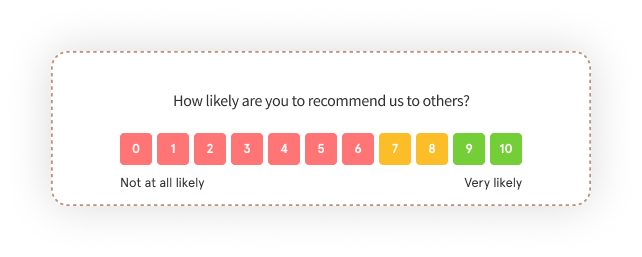
2. Website Navigation Question:
"On a scale of 1 to 10, how easy was it to navigate our website?"
AI can interpret numerical responses and identify trends in user experience.
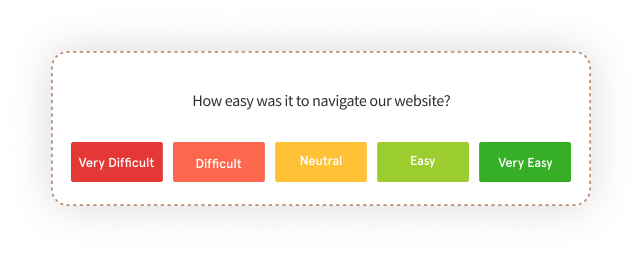
3. Customer Service Satisfaction Question:
"How satisfied are you with the customer service you received?"
AI can process sentiment analysis to categorize responses as positive, negative, or neutral for your customer service surveys.
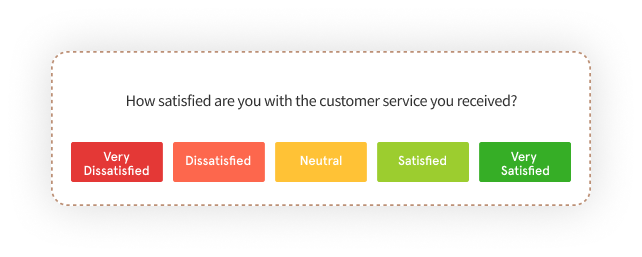
4. Product/Service Quality Rating Question:
"How would you rate the quality of our product/service?"
AI can analyze numerical ratings and identify patterns in product/service perception.
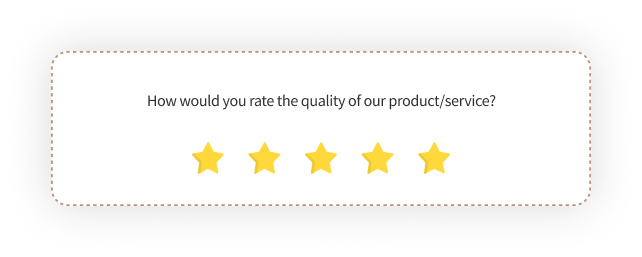
5. Feature Enhancement Question:
"What features would you like to see added to our product/service in the future?"
AI can categorize and prioritize feature requests based on user input.
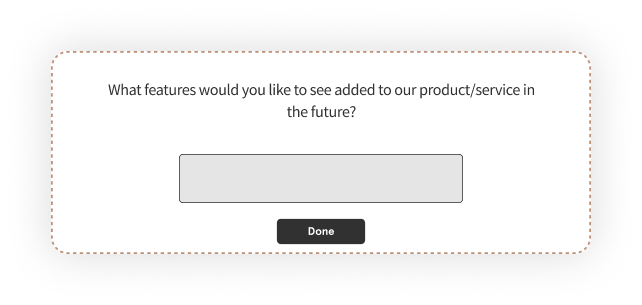
6. Communication Preference Question:
"What is your preferred method of communication for receiving updates and promotions from us?"
AI can help segment respondents based on communication preferences.
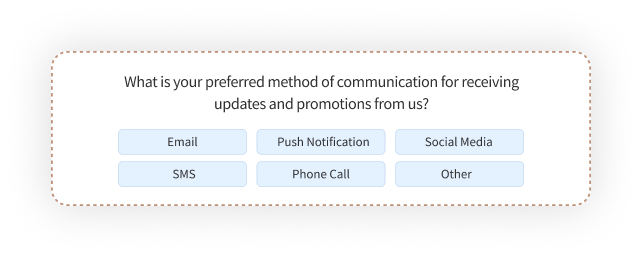
7. Customer Loyalty Question:
"How likely are you to continue using our product/service in the future?"
AI can analyze loyalty trends and identify factors influencing customer retention.
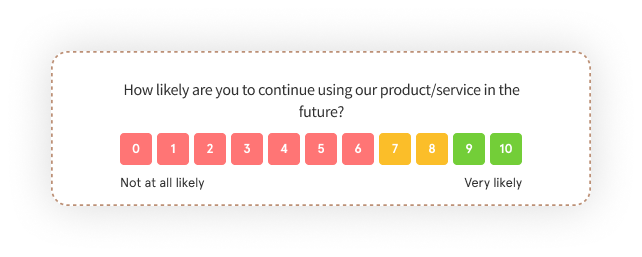
8. Issue Resolution Question:
"Have you encountered any issues or challenges while using our product/service? If yes, please describe."
AI can perform sentiment analysis on textual responses to highlight specific concerns.
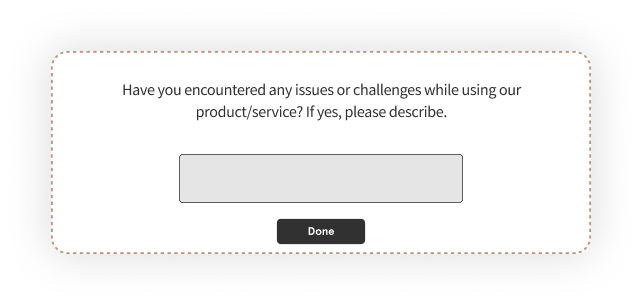
9. Marketing Effectiveness Question:
"How did you first hear about our company/product/service?"
AI can categorize sources and assess the effectiveness of different marketing channels.
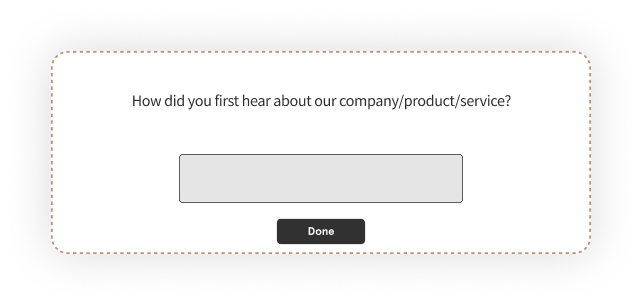
10. General Feedback Question:
"Is there anything else you would like to share or any suggestions for improvement?"
AI can identify recurring themes in open-ended responses for actionable insights.
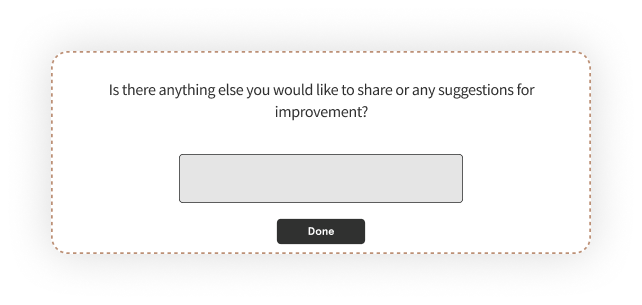
How to Create Effective AI Surveys?
Creating effective AI surveys isn’t about outsourcing the task to a machine. It’s about using intelligence—artificial and human—to ask the right questions, in the right way, at the right time.
Done well, AI survey tools not only increase participation but also improve the quality of responses and surface insights that are otherwise buried in free text or ignored in open rates. Here’s how to get it right.
1. Start With a Clear Objective
Before you launch any survey—AI-powered or not—ask yourself: What am I really trying to learn?
Are you measuring satisfaction after a feature launch? Diagnosing churn triggers? Gauging usability for a beta release? Each goal demands a different approach, and your AI tool is only as smart as the context you give it.
Clear objectives sharpen the questions AI generates. They keep the flow lean, the insights sharp, and the data immediately usable.
2. Use the Right Question Formats
AI is great at generating smart, varied questions. But you still need to choose formats that match your goal—and your audience’s attention span.
Multiple-choice questions tend to get higher response rates, especially on mobile. They’re quick, structured, and easy to analyze. But if you want richer insight, add an open-ended question—then let your AI handle the heavy lifting with sentiment and theme analysis.
Mix in rating scales, Likert scale questions, or image-based inputs depending on the context. A good AI survey feels intuitive, not repetitive.
3. Keep It Concise but Contextual
Length kills response rates. But lack of context kills insight. Strike a balance by asking only what’s necessary—then give your AI survey questions the nuance they need. Instead of asking “How was your experience?” in your survey draft, try “How easy was it to navigate the new dashboard today?”
AI surveys thrive when it has a little context to work with. And respondents appreciate when you respect their time and intelligence.
💡Surveys under 3 minutes have up to 40% higher completion rates. Hence, its best to keep your AI survey concise.
4. Layer In Personalization
Personalized surveys don’t mean using someone’s first name. It means asking questions that feel tailored to their experience. With AI survey taker, you can automatically adjust the flow based on previous answers, behavior, location, or even CRM attributes.
If a customer just interacted with support, the survey can ask about resolution clarity. If they skipped a feature, the AI might gently probe why. Personalization increases response quality—because the questions feel like they actually matter.
5. Test the Flow Using Skip Logic & Branching
Before going live, preview the full journey from the respondent’s point of view.
Use skip logic and branching conditions to avoid irrelevant questions and keep the path focused. Someone who just gave you a 10 on an NPS question shouldn’t be asked what went wrong.
And don’t just rely on the tool’s preview. Share the survey with internal testers or a small user group first. AI may automate a lot, but testing brings the human lens—ensuring clarity, flow, and emotional tone all land right.
6. Use Automated Follow-Ups and Alerts
Once the feedback rolls in, AI can help keep the conversation going. Set up automated follow-ups for specific responses. If someone rates their experience poorly, trigger a deeper AI survey that uncovers what went wrong. If a customer shows high satisfaction, follow up with a referral ask or loyalty reward.
And on your end, configure alerts so key team members are notified when certain thresholds are hit—like a drop in CSAT or recurring complaints about a feature. This is where AI helps you close the feedback loop faster, not just collect feedback.
7. Monitor Performance in Real-Time
Don’t wait for a reporting day to know what’s happening. Modern AI survey builder give you real-time dashboards with sentiment snapshots, response trends, and completion rates by device or audience. Keep an eye on what’s working—and what’s falling flat.
If you see drop-offs after a certain question, revise it. If open-ended responses spike with emotional keywords, dig in. The goal isn’t just to send a better survey. It’s to build a live, adaptive feedback system that evolves as your users do.
Top Tips on Using AI Survey from Zonka Feedback's Product Team
To help you create surveys that work, we reached out to the Product Team here at Zonka Feedback Product to get their top tips when it comes to using AI Surveys and AI survey maker. Here's what they had to say:
a. Personalize Based on Past Behavior or Segments
“Generic surveys get generic answers,” one of our product leads said—and they’re right.
One of the easiest wins with AI is tailoring survey flows based on what your customers have done, not just who they are. Whether a user just completed a transaction, skipped a feature, or interacted with your support team, Zonka Feedback’s AI Feedback Intelligence lets you trigger AI-generated surveys that reflect their actual journey.
b. Add Depth to Feedback with Contextual Follow-Ups
One of the most underrated wins is letting the AI ask that next best question—right when it matters. With Zonka's AI Feedback Intelligence, open-ended responses don’t have to end the conversation. If a customer says something like, “The checkout was confusing,” the AI can instantly follow up with a clarifier like, “Was it the payment step or the cart flow?”
It’s like having a built-in interviewer that knows when to dig deeper— CX team quickly identify root causes and respond with precision—turning guesswork into confident decisions.
c. Leverage AI Sentiment Analysis for Open-Ended Responses
Open-text feedback can be a goldmine—but only if you can decode it fast enough. With Zonka Feedback's built-in sentiment analysis tools and text analysis tools, you don’t need to manually tag or interpret responses. The AI automatically scans every comment, categorizes the sentiment (positive, negative, or neutral), and highlights recurring emotions or friction points.
Let’s say a customer writes, “The feature is powerful but really hard to use.” AI picks up the mixed sentiment and tags it accordingly—helping product and support teams drill into frustration, not just the feature itself.
d. Automate Triggers Based on Negative Feedback
Negative feedback is only valuable if it reaches the right people—fast. That’s why our team recommends setting up automated triggers for low NPS scores, flagged sentiments, or specific keywords like “cancel,” “refund,” or “confusing.” With entity recognition, the AI not only detects what’s wrong, but also ties it to the right issue—whether it’s a feature, agent, or location.
You can instantly send follow-up AI surveys, notify managers, or even start a recovery workflow—all while your team is still in the moment.
e. Use Response Monitoring to Enable CX Teams to Intervene Early
If something’s trending downward—response quality, satisfaction, or completion rates—AI should be the first to know. Our team recommends leveraging the real-time response monitoring dashboard to detect shifts in feedback before they escalate.
What’s even better? With Zonka Feedback's AI Copilot, you can ask things like “Why are users dropping off after question 3?” and get instant, theme-based explanations and resolution suggestions. It’s like having an analyst in your inbox 24/7.
f. Segment Audiences With Predictive Tags
Not every survey response needs the same follow-up—and AI makes that possible. Zonka Feedback's predictive tagging automatically groups users by behavioral and emotional signals: likely to churn, potential promoter, confused by onboarding, and more. These AI-generated segments help you prioritize outreach, customize next steps, and close the loop faster—with less guesswork.
If your goal is smarter targeting and timely engagement, this is the feature our team swears by.
Conclusion
AI surveys aren’t just a trend—they’re a smarter, faster, and more human way to understand what your customers are really saying. In a world where expectations change by the minute and loyalty is earned one touchpoint at a time, the ability to capture feedback that’s both meaningful and timely is a competitive advantage.
From onboarding to churn, from usability to emotion—AI surveys unlock patterns that traditional surveys miss. And when you design them thoughtfully—with the right objectives, question logic, and personalization—you create space for conversations, not just data points.
The best part? You don’t need to be a data scientist to act on this intelligence. With the right customer experience tool, AI does the heavy lifting—analyzing sentiment, flagging issues, mapping entities, and even answering your most pressing questions with instant summaries.
That’s where Zonka's AI Feedback Intelligence comes in. Built to turn raw feedback into real-time decisions, it gives your team the power to listen smarter and act faster. Whether you want to track sentiment shifts, auto-segment users, or ask your AI Copilot what’s driving churn—it’s all built in.
Sign up for early access or schedule a demo to explore how you can make every survey smarter, every response count, and every customer feel heard. Because great questions are just the beginning. What you do with the answers? That’s where the intelligence kicks in.
